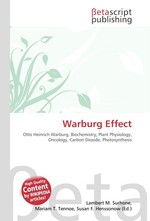Warburg Effect
Lambert M. Surhone, Mariam T. Tennoe, Susan F. Henssonow
бумажная книга
High Quality Content by WIKIPEDIA articles! The phrase "Warburg effect" is used for two unrelated observations in biochemistry, one in plant physiology and the other in oncology, both due to Nobel laureate Otto Heinrich Warburg.In plant physiology, the Warburg effect is the inhibition of carbon dioxide fixation, and subsequently of photosynthesis, by high oxygen concentrations. The oxygenase activity of RuBisCO, which initiates the process of photorespiration, largely accounts for this effect.In oncology, the Warburg effect is the observation that most cancer cells predominantly produce energy by a high rate of glycolysis followed by lactic acid fermentation in the cytosol, rather than by a comparatively low rate of glycolysis followed by oxidation of pyruvate in mitochondria like most normal cells. The latter process is aerobic (uses oxygen). Malignant rapidly-growing tumor cells typically have glycolytic rates that are up to 200 times higher than those of their normal tissues of origin; this occurs even if oxygen is plentiful.
Данное издание не является оригинальным. Книга печатается по технологии принт-он-деманд после получения заказа.


